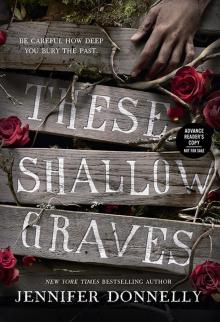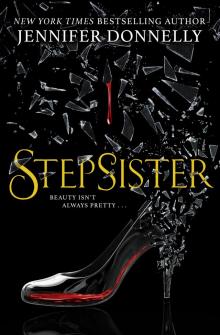- Home
- Jennifer Donnelly
The Winter Rose Page 15
The Winter Rose Read online
Page 15
"Absolutely right, my boy!" shouted John Phillips, a paper manufacturer.
There were shouts of approval, words of encouragement, applause. Even Sir Stuart nodded, seemingly mollified. John Phillips stood, wiped his mouth, and proposed a toast.
"To Freddie Lytton," he said. "He understands us, he speaks for us, and I, for one, want him to represent us. Freddie, my boy, you have my full support."
Another chorus of "Hear! Hear!"s went up. Glasses were raised. Nearly all of them. Freddie smiled warmly, but his sharp eyes were busy. He noted that Edwin Walters, a button manufacturer, hadn't raised his, but only because he was motioning for a refill. Donald Lamb, who owned a silver-plating works, hadn't either, because he'd dropped a roll in his lap and was busy retrieving it. Joe Bristow had not raised his glass either, but he seemed to have no reason for not doing so. He was sitting back in his chair, an unreadable expression on his face.
"What does Home Rule do for East London, Freddie?" he finally asked when the cheering died down. "What does it do for dockers and matchgirls and charladies in Whitechapel and Wapping and Limehouse?"
Freddie's smile tightened. He should have expected as much from Bris-tow. He was a merchant, but he didn't act like one. He didn't complain about taxes. He didn't demand that the government control unions and jail striking workers. Instead, he championed labor's causes. It was bloody irri-tating. Bloody perverse.
"Well, Joe, as you know, quite a few of my constituents, and your workers, are Irish. By speaking for Home Rule, I speak for them. Ireland's con-cerns are their concerns. Surely you see that?"
"No, Freddie, I don't," Joe said. "If an Irishman's in East London, then he's no longer in Ireland, is he? Why has he left? To find work. To earn higher wages. So he can feed and clothe his kids. Keep them in school instead of sending them into the factories. He doesn't give a damn if West-minster's rowing with Dublin. He wants to know he can join a union without getting sacked. What are you going to do for him?"
"I'm very glad you asked that," Freddie said, practiced and smooth. "The answer is this: as much as I possibly can. I've already embarked on an am-bitious agenda of social reform in the East End. I've recently secured a do-nation to the Toynbee Mission Girls' School, as I'm sure you know, and I'm working closely with a young doctor in Whitechapel on an idea of mine to open free clinics for expectant mothers and babies. I'm looking into milk allowances for infants, a program of health and hygiene instruction for primary-school children, and I'm chairing a committee on how to promote better school attendance among poor children of all ages. There's more to my plan, so much more, but I see that the waiters are trying to bring out the Beef Wellington, and I fear I shall have an insurrection on my hands if I delay them a minute longer."
Joe looked as if he wished to say more, but laughter from the other guests curtailed further questions--as Freddie had known it would. Phillips, Wal-ton, and all the rest were more concerned about their beef growing cold than they were about transplanted Paddies who couldn't even vote.
Freddie took his seat again and smiled, pleased. It was shaping up to be a successful evening--despite Joe Bristow. Freddie calculated that he'd bought himself the support of nearly every man here--about forty in all-- and by extension the votes of their enfranchised East London workers, which would total in the thousands. His guests were certainly enjoying themselves--eating and drinking, laughing and talking.
He'd certainly given them plenty to talk about. Earlier in the evening, he'd spoken at length on his anti-crime measures and his strong support for the Employers' Parliamentary Council--an organization that existed to curb the advances made by workers and their unions. He'd made sure that when answering Joe's questions, he kept his concessions to workers fo-cused on children. Even the most grasping employers realized that today's slum children were tomorrow's dockworkers, and that ignorance and hunger would leave them too stupid to read the label on a tea chest and too weak to lift it. The hardest sell of the evening had been Home Rule, but he'd even managed to make that palatable.
Freddie commended himself on his decision to host the dinner at his club. There was something about the Reform Club, something that imme-diately put a man at ease, made him feel genial and expansive. No matter how terrible a day he'd had, Freddie always felt better when he walked through its doors. Perhaps it was the smell--leather mixed with wine, wood, and tobacco. Perhaps it was the calming presence of the waiters-- polite, unobtrusive souls who always knew what he wished to eat and drink, and brought it, before he himself did. Perhaps it was the company-- all fellow Whigs with whom he could talk politics endlessly. Or perhaps it was the refreshing lack of women.
The Reform was a club for members of the Liberal Party. Built of Port-land stone in the style of an Italian palazzo, its exterior was solid and com-manding, its interior spare and masculine, totally devoid of feminine clutter. It was an oasis, a place where men could escape their wives and mistresses. Where they could sit in comfortable chairs by a blazing fire and read the papers with a glass of port and a plate of Stilton, undisturbed. A place where they could speak freely and colorfully, without worrying about offending feminine sensibilities.
Freddie had reserved a private room for his guests. He had told the chef to spare no expense on the food, the wine, or the cigars. And it had paid off. He was just beginning to relax, to enjoy the meal, when a waiter bent to his ear and quietly informed him that a visitor, a detective, wished to see him.
Freddie followed the waiter downstairs to a small reception room. Alvin Donaldson was waiting for him. He was Freddie's man. He paid some vil-lains for information, knocked it out of others, and generally kept Freddie apprised of laws bent or broken by both sides--the villains and the police.
"I'm sorry to disturb you," Donaldson said, skipping a greeting, "but there's been a robbery on the river and I thought you'd want to know."
"Where?" Freddie asked tersely.
"The Stronghold Wharf."
"Damn it!" That was in Limehouse. His constituency.
"It's a big one. A large shipment of guns was taken. No one knows exactly how or exactly when, but they were stolen. No doubt about it. And the papers are all over it."
"Bloody hell! It's Malone!" Freddie said, furious. "You know it is! Arrest him! I want his head!"
"We can't arrest him. We have suspicions, that's all. Nothing concrete."
"Find something!"
"We don't even have a witness."
"Get one! Pay somebody, can't you? How much do you need?" he asked, reaching for his wallet.
Donaldson laughed. "There isn't enough money in all of London to pay a man to finger Sid Malone. You know that, Mr. Lytton."
Freddie swore again. He ran a hand through his hair. This was a disas-ter. He'd just spent the evening, and a small fortune, trying to convince forty important businessmen--all of whom owned premises on or near the river--that he was tough on crime, that he had the criminal element under control. What would they think when they saw the morning papers?
"I want him in jail by tomorrow morning."
"But--"
"I said I want him in jail. Since you can't seem to nab him for any robberies, find something else. Does he beat his horse? Kick his dog? Are his bloody library books overdue? Get something on him, Donaldson. Don't disappoint me or I'll make some other crooked detective rich," he said, slapping two ten-pound notes into the man's hand.
Then he left Donaldson to pocket his cash and rejoined his guests.
"Everything all right?" the man on his left asked him. He owned two breweries in Whitechapel and a wharf in Wapping.
"Right as rain," Freddie said, smiling. "A bit of government business to attend to, that's all." He took a deep breath, cut into his beef, and pretended to enjoy it. His nerves were humming, but he couldn't show it. Hopefully his twenty-pound bribe would motivate Donaldson. If he found a reason to arrest Malone, if the man was already in jail when the story broke, then he--Freddie--might just come out of this a hero.
&
nbsp; And if not? he asked himself. Well then, old mole, he thought, you've just guaranteed a win come election time ...for Dickie Lambert.
Chapter 11
"You still here, Dr. Jones?" asked Bridget Malloy, matron of the London Hospital's casual ward, where the poorest patients were tended. "I thought
you'd finished your rounds."
"I have, but I want to stay for a bit to check up on the little girl who came in an hour ago. Mary Ellerton. Admitted as an emergency. Couldn't catch her breath. She's stable now, but I'm still worried," India replied, flip-ping back pages on her clipboard to get to the notes she'd taken.
"TB?"
"I think so."
"Has she had any treatment? Have the parents done anything at all for her?"
"As a matter of fact, yes. They gave her a fried mouse to eat."
Sister Malloy laughed. "I can't believe that one's still around. It was old when I was a girl."
India did not laugh. "I wouldn't believe it either if I hadn't seen it once myself. As a student. I also saw a child fed live maggots to cure her of tu-berculosis. Another was made to walk seven times around a donkey to ease her whooping cough."
"Well, at least little Mary Ellerton got a bite of meat," Sister Malloy said.
"What could her mother have been thinking? Frying vermin..."
"You've children yourself, have you, Dr. Jones?"
"No, I haven't." People were always asking that. It drove her mad.
"Ah, well," Sister Malloy said. As if that explained everything.
It didn't. Not to India. " �Ah, well' what?" she pressed.
"Mrs. Ellerton's a very poor woman, isn't she? The poor don't have money, but they have mice."
"Sister Malloy, I deplore such willful ignorance. Surely you don't de-fend it?"
Sister Malloy's pale blue eyes regarded India. The look in them sug-gested that she indeed deplored willful ignorance, but not in Mrs. Ellerton.
"Dr. Jones," she said, "it's a terrible thing to love a child and see her suf-fer and not be able to do anything for her. Frying a mouse is doing some-thing. Not the best thing, I'll admit, but something. It's only an old wives' tale to you and me, but to a poor desperate mother whose child is failing... well, it's hope, isn't it?"
India was just about to lecture her on the diseases mice carried when a junior sister came flying down the corridor. "Dr. Jones!" she yelled. "You're needed on the emergency ward, ma'am."
"Stop shouting, Evans," Sister Malloy ordered.
"Yes, ma'am. Sorry, ma'am."
"Is it Mary Ellerton?" India said, starting down the corridor.
"It's a new patient. Just came in. Off his head with fever."
"Where's the house surgeon?" Sister Malloy asked.
"There was a crash on the High Street. Two carriages and an omnibus. Dr. Merrill's up to his neck. He asked me to fetch whomever's available."
India could hear the screams coming from the emergency ward well before she got there. As she burst through the swinging doors that closed the cavernous, whitewashed room off from the rest of the hospital, she saw three nurses and a medical student struggling to hold down a man whose legs were mangled. Next to him, two more nurses were cutting the clothes off an unconscious woman.
Dr. Merrill rushed past India with a keening child in his arms. "Bed One. By the sink," he shouted. "Fever, hallucinations. Might be infec-tious.... Evans! Chloral! Now!"
India ran to the far end of the ward, skidded on a slick of blood, and righted herself. She saw Bed One and she saw a man stretched out on it. At least, she thought he was a man, she could see his shoes and the top of his head, but the rest of him was covered with jackets. Two men stood near him in their shirtsleeves.
"What's going on here?" she asked, peeling the jackets away. "Why have you covered him like this? He can barely breathe!"
"He's freezin' to death, ain't he?" one of the men said. He had the mashed nose of a brawler. "Where the hell you been, missus? Where's the bloody doctor?"
"I am the bloody doctor," India replied. "What's his name?" As she un-covered his face she realized with a start that she knew it already. It was Sid Malone.
"I never heard of a lady doctor," the man blustered.
"Hold on, Tommy, she is a doctor. She's the doxie from Ko's. Remem-ber?" the second man said. He was young and wiry.
India didn't hear them; she was too busy taking her patient's vital signs. His pulse was frighteningly weak, his breathing was shallow, and his pupils constricted. He was barely conscious. The heat of his skin told her that his fever was dangerously high, but when she tried to insert a thermometer into his mouth, he struggled so violently that she thought he would bite through the glass.
"How long has he been like this?" she asked, trying the thermometer once more. "Come on now, Mr. Malone."
"Since this morning," the wiry man replied.
India timed the thermometer, then pulled it out. "Good God. One hun-dred and six. Has he vomited? Had any head pain? Rashes? Has he been around ships or sailors?"
The man hesitated, then said, "He has a cut."
"A cut? Where?" India took Sid's hands in her own and turned them over, thinking she might have missed a puncture.
"Not there. On his side. His right side."
India opened Sid's jacket. Yellow and brown stains bloomed like rotted flowers across his shirt. A dark, low odor hit her. She opened his shirt, peeled away a makeshift dressing, then gasped. A yawning, jagged wound ran from his armpit to his hip. Its edges were black and weeping pus. She could see his ribs showing whitely through the ripped fiesh. India knew she didn't have a second to lose. She scanned the ward; it was bedlam. All the staff were busy with accident victims.
"You," she barked at the second man. "What's your name?"
He hesitated.
"Your name!"
"Frankie. Frankie Betts."
"Get his clothes off, Mr. Betts."
"What, all of them?"
"Yes! Now! Move! You"--she beckoned to Tommy--"come with me." She rushed to the sink, plugged it, and turned on the cold tap. Then she snatched half a dozen sheets from a shelf and tossed them in. "Wet them, wring them, lay them on Mr. Malone."
"But how--"
"Just do it."
She raced to a glass cabinet and grabbed vials of quinine, chloral, and carbolic acid. She veered off to the supply room and threw a basin, needles, suturing silk, scissors, a scalpel, dressings, a cautery iron, and a syringe onto a tray. She grabbed a second basin on her way out, mindful that most people were not used to the smell of burning fiesh.
As she headed back to Bed One, she could hear Tommy insisting to Frankie that Sid have a private room. They were barmy to have Sid in an open ward, he said. He was off his nut. There was no telling what he'd say, or who he'd say it to. What if someone heard him? What if Billy Madden found out he was in the hospital? The sneaky sod would be sniffing around their manor in no time.
"The doctor said he's to stay here for now. And here's where he's staying. It's your fault he's in this condition, Tommy. I said we should have brung him two days ago."
"You was wrong, Frankie! He said himself he wasn't goin' to no bleedin' hospital."
"Move!" India shouted.
Frankie stepped aside and India slammed her tray down on the table next to Sid's bed. The two men had managed to get Sid undressed and were swathing him with wet sheets.
"Make sure you wrap one around his head," she ordered, racing off one last time to scrub her hands and fill one of the basins with hot water.
When she returned, she pulled a stool over to the bed with her foot. Sid was completely encased in cold wet sheets and shivering convulsively.
"How did this happen?" she asked, lifting his head and coaxing him to swallow a dose of quinine to fight the fever. Neither man answered. "Mr. Betts," she said, "I am a doctor, not a police constable. I don't care what Mr. Malone was doing when he got this injury, but I need to know how and when he was injured."
"Can yo
u help him, missus?"
"That is precisely what I am trying to do."

 Rogue Wave
Rogue Wave Waterfire Saga, Book One: Deep Blue (A Waterfire Saga Novel)
Waterfire Saga, Book One: Deep Blue (A Waterfire Saga Novel) Revolution
Revolution The Wild Rose
The Wild Rose Waterfire Saga (4 Book Series)
Waterfire Saga (4 Book Series) These Shallow Graves
These Shallow Graves Beauty and the Beast: Lost in a Book
Beauty and the Beast: Lost in a Book A Northern Light
A Northern Light The Tea Rose
The Tea Rose Waterfire Saga, Book Three: Dark Tide: A Deep Blue Novel
Waterfire Saga, Book Three: Dark Tide: A Deep Blue Novel The Winter Rose
The Winter Rose A Gathering Light
A Gathering Light Stepsister
Stepsister Waterfire Saga, Book Four: Sea Spell: Deep Blue Novel, A
Waterfire Saga, Book Four: Sea Spell: Deep Blue Novel, A Northern Light
Northern Light Winter Rose, The
Winter Rose, The